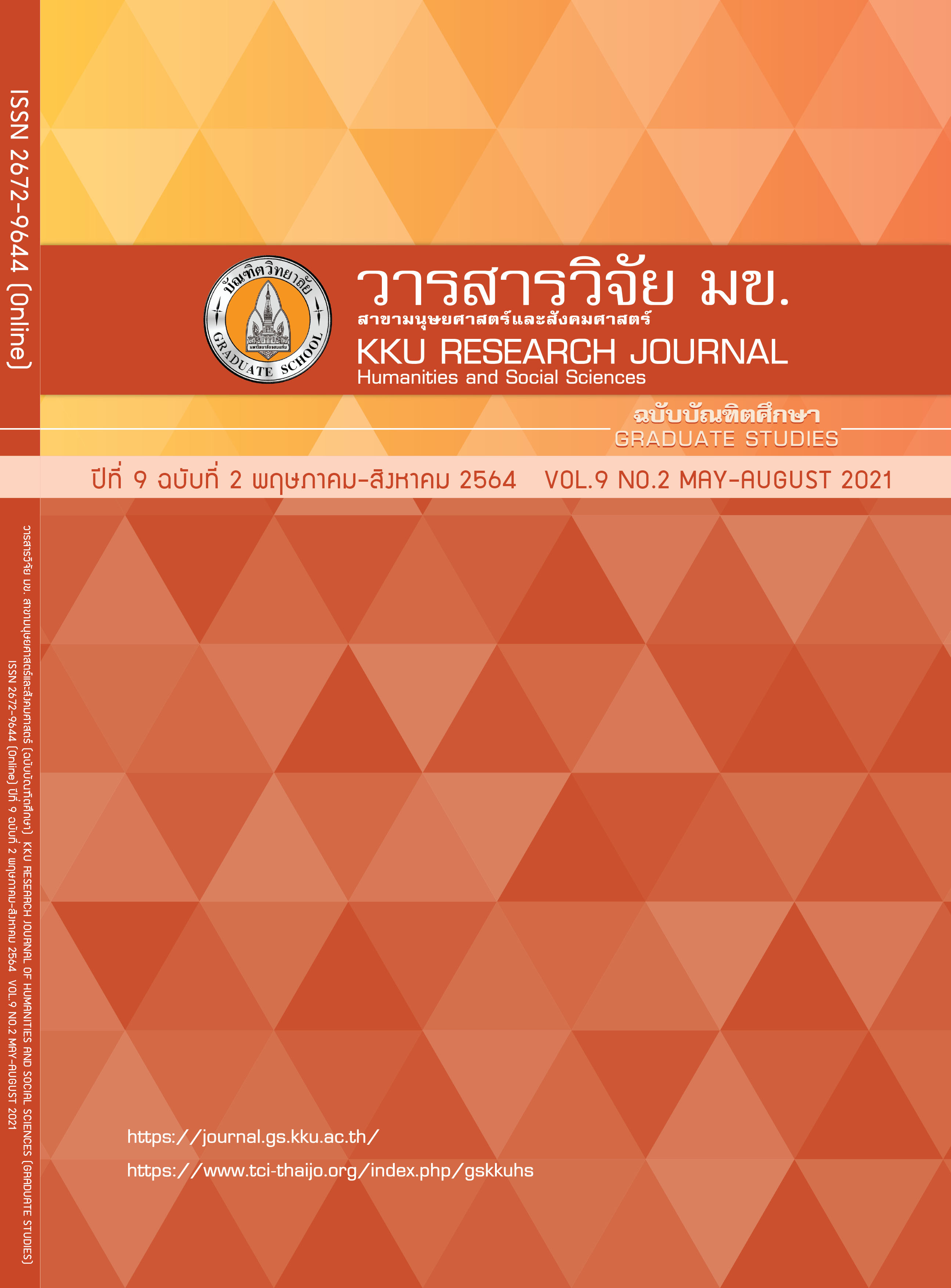The Influence of Total Quality Management on Non-Financial Production Productivity of Chemical (Resin) Industry in Thailand
Keywords:
Total quality management, Non-financial productivityAbstract
This research was to examine the influence of total quality management on non-financial production productivity of chemical (resin) industry in Thailand. Total quality management comprises of five aspects, including leaderships, quality improvement, process improvement, employee involvement, customer focus. Non-financial production productivity is measured by technology and continuous improvement, employee performance, speed, quality, customer satisfaction. The result of multiple regression analysis drawing on 357 respondents revealed that quality improvement and customer focus appear to be the most significant factors in enhancing the non-financial production productivity.
References
Office of the Permanent Secretary Ministry of Commerce [Internet]. Thailand Trading Report. 2019 [cited 2020 June 15]. Available from: http://www2.ops3.moc.go.th/
Sananuch, S. It's time for the government sector to measure productivity. 2016 [cited Dec 23 2019]. Available from: https://www.ftpi.or.th/2016/7682
Gupta M, Campbell VS. The cost of quality. Production and Inventory Management Journal. 1995; 36(3): 43-49.
Ahmed Al-Dujaili M A. Study of the relation between types of the quality costs and its impact on productivity and costs: A verification in manufacturing industries. Total Quality Management & Business Excellence. 2013; 24(3-4): 397–419.
Ahire S, Golhar D, Waller M. Development and validation of TQM implementation constructs. Decision Sciences. 1996; 27(1): 23-56.
Hackman JR, Wageman R. Total quality management: Empirical, conceptual and practical issues. Administrative Science Quarterly. 1995; 40: 309-342.
Saraph JV, Benson PG, Schroeder RG. An instrument for measuring the critical factors of quality management. Decision Sciences. 1989; 20(4): 810-829.
Kanji GK, Asher M. Understanding total quality management. Advances in total quality management. 1993; 9-17.
Flynn B, Schoeder R, Sakibaba S. A framework for quality management research and associated measurement
Anderson JC, Rungtusanatham M, Schroeder RG. A theory of quality management underlying the Deming management method. Academy of Management Review. 1994; 19(3): 472-509.
Powell TC. Total quality management as competitive advantage: A review and empirical study. Strategic Management Journal. 1995; 16(1): 15-37.
Black S, Porter L. Identification of the critical factors of TQM. Decision Sciences. 1996; 27(1): 1-21.
Zeitz G, Johannesson R, Ritchie JE, Jr. An employee survey measuring total quality management practices and culture: Development and validation. Group & Organization Management. 1997; 22(4): 414–444.
Motwani J. Critical factors and performance measures of TQM. The TQM Magazine. 2001; 13. 292-300.
Phelps LD, Parayitam S, Olson B.J. Edwards Demimg, Mary P. Follett and Frederick W. Taylot: Reconciliation of difference in organization and strategic leadership. Academy of Strategic Management Journal. 2007; 6: 1-14.
Wayhan VB, Khumawala BM, Balderson EL. An empirical test of Deming’s chain reaction model, Total Quality Management & Business Excellence. 2010; 21(7): 761-777.
Iyer A, Saranga H, Seshadri S. Effect of quality management systems and total quality management on productivity before and after: Empirical evidence from the Indian auto component industry. Production and Operations Management. 2013; 22(2): 283–301.
Mohanty RP. Understanding the integrated linkage: Quality and productivity. Total Quality Management. 1998; 9(8): 753-765.
Shurchuluu P. National productivity and competitive strategies for the new millennium. Integrated Manufacturing Systems. 2002; 13(6): 408-414.
Buathong S, Bangchokdee S. Use of financial and non-financial performance measures within contingency theory. Journal of Accounting Profession. 2015; 11(31): 63-79.
Kitirach, R. Causal relationships between total quality management, non-financial and financial performance of tire wheel manufacturing industry in Laem Cha Bang industrial estate. Master’s thesis, Kasetsart University; 2018.
Kiyohiko, S. Japanese worker attitudes: A key factor in productivity. International Journal of Operations & Production Management. 1986; 6(1): 42-53.
Schermerhorn JR. Productivity perspectives in management development. Journal of Management Development. 1986; 5(2): 3-6.
King RA. Manufacturing strategy for productivity improvement. Journal of Business Strategy. 1989; 10(2): 62-63.
Callaghan, B. Productivity for profit. Work Study. 1990; 39(2): 6-19.
Magrath, A. (1992). The management of marketing productivity. Journal of Business & Industrial Marketing. 1992; 7(4): 49-54.
Stainer A, Stainer L. Productivity, quality and ethics–a European viewpoint. European Business Review. 19995; 95(6): 3-11.
Stabler A. Productivity, performance measurement and management in logistics. Asia Pacific Journal of Marketing and Logistics. 1996; 8(2): 46-63.
Stainer, A. (1997). Capital input and total productivity management. Management Decision. 1997; 35(3): 224-232.
Sethi, R. (2000). New product quality and product development teams. Journal of Marketing. 2000; 64(2): 1-14.
Oeij PRA, De Looze MP, Ten Have K, van Rhijn JW, Kuijt‐Evers LFM. (2011). Developing the organization's productivity strategy in various sectors of industry. International Journal of Productivity and Performance Management. 2011; 61(1): 93-109.
Moore DA, Tenney ER. Time pressure, performance, and productivity. Research on Managing Groups and Teams. 2012; 15: 305-326.
Apibunyopas P. Exploratory Factor Analysis, Organizational Research. Modern Management Journal. 2015; 13(2): 23-36.
Fabrigar LR, Wegener DT, MacCallum RC, Strahan EJ . Evaluating the Use of Exploratory Factor Analysis in Psychological Research. Psychological Methods. 1999; 4: 272-299.
Ford JK, MacCallum RC, Tait M. The Application of Exploratory Factor Analysis in Applied Psychology: A critical Review and Analysis. Personnel Psychology. 1986; 39: 291-314.
Misterek S, Dooley KJ, Anderson JC. Productivity as a performance measure. International Journal of Operations & Production Management. 1992; 12(1): 29-45.
Srisawad N. The relationship between total quality management (TQM) strategy and innovation in animal feed industries. Master’s thesis, Kasetsart University. 2013.
Uyar A. An exploratory study on quality costs in Turkish manufacturing companies. International Journal of Quality & Reliability Management. 2008; 25(6): 604-620.




